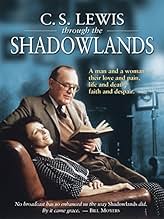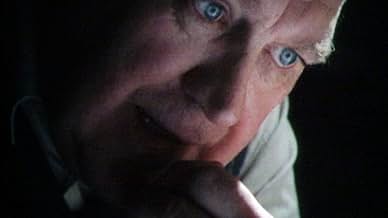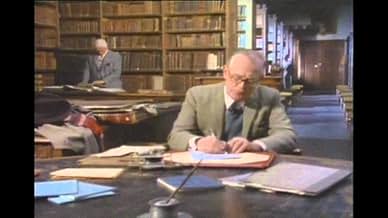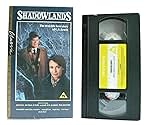Aggiungi una trama nella tua linguaNoted author and scholar finds love, then must endure its loss...Noted author and scholar finds love, then must endure its loss...Noted author and scholar finds love, then must endure its loss...
- Ha vinto 2 BAFTA Award
- 3 vittorie totali
Recensioni in evidenza
Clives Staples Lewis (known as "Jack" to his friends) was a truly brilliant Oxford Don who brought Christianity (at least in a general way) into the educated forums. While one can regret his not having embraced the Gospel quite as fully as did his friend J. R. R. Tolkien, he nevertheless contributed enough to be of genuine value even so. The beauty of this version (in comparison to the other) is how one truly gains a far better view of who he is, what makes him tick, and also not only who he was but who the others in his life were, not only Joy but also his brother Warnie, and his circle of friends, the "Inklings." The relative accuracy of this version adds substantially to the emotional depth of the loss. Though the particulars of each person's grief varies, it is ironically in those particulars that each person's grief is most united to everyone else's particular griefs. There is a moment when, looking at the two boys facing their own grief in losing their mother, he looks at Warnie standing next to him and comments on how the two of them now is a repeat of what it had been for himself and Warnie so many years previous when their own mother was lost and they were of a similar age.
You just can't get moments like that in a movie that doesn't even bother to show that Joy had two sons instead of merely one. In this version, he really is C. S. Lewis, the great writer not only of the fanciful Narnia Chronicles, but also of many brilliant essays on Christian moral and even doctrinal concerns, someone who has made serious thought about important things actually interesting, someone who tells his readers things they never thought of before and are now all the richer for now knowing, and yet he is also someone on the verge of having to eat all of his own brilliant words in the face of this suffering. He had written most beautifully about the Love of God; but where was that love now in his wife's sickness, suffering, and death? Even the small-budget atmosphere of the BBC production actually adds to its weight. Despite his being well-known, he lived a "small" life which revolved around his academic profession, his friends, his writing, his Faith, his family, and his wife. A vast Hollywood budget would have only brought in distractions and destroyed the focus. The movie, by contrast, has practically nothing to do with C. S. Lewis at all. The casting of Anthony Hopkins as C. S. Lewis is just plain wrong, like casting Peter Lorre as Abraham Lincoln, and the lines given him are full of vague New Age aphorisms instead of the precise Christian expositions which defined C. S. Lewis' entire existence and fundamental being. Unlike this BBC version, the film presents a generic anonymous character who could be just about anyone, blubbering over his wife in her sickness and death.
You just can't get moments like that in a movie that doesn't even bother to show that Joy had two sons instead of merely one. In this version, he really is C. S. Lewis, the great writer not only of the fanciful Narnia Chronicles, but also of many brilliant essays on Christian moral and even doctrinal concerns, someone who has made serious thought about important things actually interesting, someone who tells his readers things they never thought of before and are now all the richer for now knowing, and yet he is also someone on the verge of having to eat all of his own brilliant words in the face of this suffering. He had written most beautifully about the Love of God; but where was that love now in his wife's sickness, suffering, and death? Even the small-budget atmosphere of the BBC production actually adds to its weight. Despite his being well-known, he lived a "small" life which revolved around his academic profession, his friends, his writing, his Faith, his family, and his wife. A vast Hollywood budget would have only brought in distractions and destroyed the focus. The movie, by contrast, has practically nothing to do with C. S. Lewis at all. The casting of Anthony Hopkins as C. S. Lewis is just plain wrong, like casting Peter Lorre as Abraham Lincoln, and the lines given him are full of vague New Age aphorisms instead of the precise Christian expositions which defined C. S. Lewis' entire existence and fundamental being. Unlike this BBC version, the film presents a generic anonymous character who could be just about anyone, blubbering over his wife in her sickness and death.
Lewis wrote that his marriage to Joy brought him a new appreciation of the body and of physical pleasures. He emphasized this pleasure, in fact. Apparently, Joy and her love removed all traces of his prudish inhibitions. The BBC film glosses over this theme almost entirely. We get the impression that the couple only played Scrabble. The film also shortchanges the theological exertions that Lewis underwent to regain his faith after Joy's death. Otherwise, I must say, a splendid film in its acting and photography. It has my enthusiastic, if limited, recommendation!
When I was searching on YouTube recently, I was surprised to see "Shadowlands" (1986). After all, I've seen the 1993 movie and enjoyed it...and I knew there previously was a play version. But I never knew that there was this made for TV version...and it's well worth seeing.
The story is about C. S. Lewis and his relationship with American authoress, Joy Davidman. It follows from their corresponding by mail to meeting to marrying and, sadly, her premature death from bone cancer.
Unlike the later and much more famous film, this version sticks closer to the real story. For example, the 1993 film omits a son...whereas Joy actually had two sons. Also, the 1993 version de-emphasized C. S. Lewis' Christian faith and focuses mostly on his fame from having written "The Lion, The Witch and The Wardrobe" and not his more overtly Christian works of fiction and non-fiction.
Overall, I really liked this version. Joss Acklund looks more like Lewis and the film is well worth seeing...and a bit depressing because real life can often be depressing and this portion of his and Joy's life is pretty sad with her untimely passing.
The story is about C. S. Lewis and his relationship with American authoress, Joy Davidman. It follows from their corresponding by mail to meeting to marrying and, sadly, her premature death from bone cancer.
Unlike the later and much more famous film, this version sticks closer to the real story. For example, the 1993 film omits a son...whereas Joy actually had two sons. Also, the 1993 version de-emphasized C. S. Lewis' Christian faith and focuses mostly on his fame from having written "The Lion, The Witch and The Wardrobe" and not his more overtly Christian works of fiction and non-fiction.
Overall, I really liked this version. Joss Acklund looks more like Lewis and the film is well worth seeing...and a bit depressing because real life can often be depressing and this portion of his and Joy's life is pretty sad with her untimely passing.
I really liked this film about love between two adults in postwar Britain. The high standards of BBC TV is evident in the production, and superb lead actors (Claire Bloom and Joss Ackland) make this an uplifting experience. Bloom and Ackland have previously worked together in theatre, and their chemistry and interaction is splendid. I recommend this version of Shadowlands over the film version of 1993.
This version did not move me as deeply as the later, Hollywood version starring Anthony Hopkins and Debra Winger. While it was beautifully filmed and superbly acted, the BBC version was more packed with dialog that imparted information which I found fascinating. It gave me a detailed glimpse of the intellectual, theological and moral considerations that motivated C. S. Lewis. It was therefore more interesting and stimulating than the Hollywood version, but not nearly as visually stunning or viscerally affecting. Still, while I did not leave a heaping mound of sodden Kleenex in the theater, I did use one, and at frequent intervals. I enjoyed this film every bit as much as the Hollywood version, and was grateful for the increased understanding I gained.
Lo sapevi?
- QuizJoss Ackland and Claire Bloom also both appear in Queenie - La stella di Calcutta (1987), Alla fine del tunnel (1995), Easter Tales (2000), and notably provide voices in the animated film La principessa e il folletto (1991), based on the novel by George MacDonald. C.S. Lewis was greatly influenced by MacDonald's fantasy writings and spiritual insights.
- Citazioni
[first lines]
C.S. Lewis: Why am I so afraid? I never knew that love could hurt so much. Yet I love you, and all I want is to love you. Beyond every door, I hear your voice saying to me, 'This is only the land of shadows. Real life hasn't begun yet.'
- Versioni alternative92-minute television version and 73-minute "abridged" version are available on DVD. The abridged version includes on-screen titles such as "January 1950" and "Two Years Later" at various points in the film. The time difference is made of cuts at the beginning of the film. 92-minute version opens with Jack at the college with a voice-over and the camera passing through a wardrobe. Another long section of cuts start when Jack is walking and reading Joy's letter, the letter is longer and includes a poem. Jack then goes into a classroom and lectures, and later returns home for tea with Warnie. After Joy and Jack's first meeting, scenes of them walking and talking around Oxford is longer. She arrives at his house with her boys, and they play chess with Warnie. Other cut scenes include Jack at a pub with his friends, and finding Douglas reading in the attic for the first time. Jack also tells Joy about when his mother died. And Joy goes to the college for a party and meets Jack's colleagues. The Christmas they spend together also includes a scene of a toast before they leave. Another section of cuts show Jack's life at the college (montage partly included in the opening credits of the abridged version), more scenes of him speaking to students, and talking to Christopher. In a final cut scene, the gardener asks Jack to come outside and he is surprised to find Joy has returned to England. Joy moves into her new house at the 36 minute mark in the full version and at the 17 minute mark of the abridged version, no cuts noted after that.
- ConnessioniRemade as Viaggio in Inghilterra (1993)
- Colonne sonoreAbide With Me
(uncredited)
Lyrics by Henry F. Lyte
Music by William H. Monk
Performed by Norman Rutherford
I più visti
Accedi per valutare e creare un elenco di titoli salvati per ottenere consigli personalizzati
Dettagli
Contribuisci a questa pagina
Suggerisci una modifica o aggiungi i contenuti mancanti





















